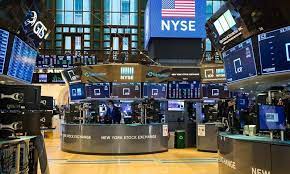Following a tumultuous January, world stocks started the new month on a more stable footing, as encouraging statements from Federal Reserve officials served to alleviate rate-hike fears.
A pan-European equity index increased by 1%. The Nikkei climbed 0.3 percent, boosted by overnight advances on Wall Street, and MSCI’s world market index soared to its highest level in almost a week.
Following a strong close on Monday, U.S. stock futures were mixed, with the Nasdaq leading the way with a 3.5 percent gain. After narrowly averting an all-time worst start to a year, the tech-heavy index concluded January on a high note.
The S&P 500 Index had its worst January since 2009.
On Monday, Fed members appeared to confirm that interest rates will rise in March, but they were cautious about what might happen next.
On Tuesday, Australia’s central bank added its two cents. It completed its A$275 billion ($194.40 billion) bond-buying program as planned, but resisted market rate-hike bets.
Expectations of a rate hike have roiled global markets. According to Deutsche Bank data, global stocks saw their worst monthly performance in January since March 2020, when the pandemic’s first wave was at its peak.
This year’s Fed rate hikes are expected to be around five quarter-point hikes, according to money markets.
“The stock market’s and bond yields’ volatility is attributable to the Fed’s lack of openness and clarity,” Eric Vanraes, a portfolio manager at Eric Sturdza Investments, explained.
Despite the Fed’s shift away from the notion that high inflation is temporary, he warned that it was still in danger of slipping behind the curve.
Vanraes believes they should be more aggressive in the short term and less aggressive thereafter.
The activity index from the United States Institute for Supply Management, which will be released later Tuesday, could indicate whether price pressures are easing.
For the Lunar New Year holidays, a number of Asian markets, notably China, were closed.
Major bourses from London to Paris and Frankfurt were up as much as 1%, with UBS, a Swiss bank, providing the biggest lift, thanks to excellent fourth-quarter earnings.
In a note, JPMorgan analysts stated, “The equities market sell-off is excessive in our opinion, and we reaffirm our suggestion to buy the dip, particularly in cyclical and small caps.”
RETREATS FOR OIL
Tensions between the West and Russia over Ukraine have knocked on risk sentiment in recent weeks, but they also boosted oil prices, with Brent futures up around 17% this year.
Brent fell 0.7 percent to $88.63 a barrel on Tuesday, weighed down by expectations that the OPEC+ group of oil producers will add more supply than previously projected at a meeting this week. The price of West Texas Intermediate crude in the United States fell 0.7 percent to $87.55.
European government borrowing costs have fallen after rising on Monday.
The 10-year Bund yield in Germany remained just over 0%, while 10-year Treasury yields in the United States fell to 1.76 percent.
The European Central Bank is expected to raise rates by 10 basis points twice by the end of the year, with a third hike possible.
This could cause a headache for ECB policymakers’ meeting on Thursday, as they had previously stated that interest rates are unlikely to rise in 2022.
The Australian dollar recovered 0.3 percent in currency markets after taking a hit from the Reserve Bank of Australia’s dovish stance. It was last worth $0.7085 at the time of writing.
The dollar was typically weaker against other major currencies, as aggressive Fed rate hike wagers gave it the upper hand. The euro was up 0.23 percent at $1.1261 at the time of writing, sterling was up nearly 0.4 percent, and the dollar was down 0.4 percent at 114.73 yen.
Russia’s rouble has recovered to around 77 per dollar, following a large-scale sell-off in January due to increasing tensions between Moscow and the West.


















